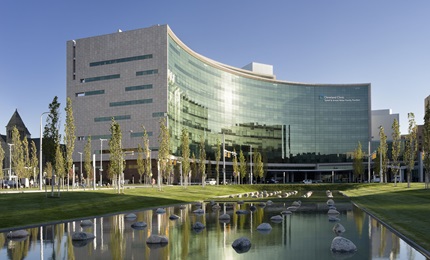Feixiong Cheng, PhD
- Call 216.444.7654
Insurance
Is Cleveland Clinic Part of Your Insurance?
Review a list of accepted insurance plans for our Northeast Ohio locations or learn more about purchasing a contracted managed care plan.
View All PlansEducation & Professional Highlights
Appointed
2018
Education & Fellowships
Graduate School - East China University of Science and Technology
Shangai,
China
2013
Undergraduate - Shanxi University of Science and Technology
Xi'an Shanix,
China
2008
Specialty Interests
Building an Individualized Network Medicine Infrastructure for Precision Cardio-Oncology.Currently, there are over 15.5 million cancer survivors in the United States (U.S.) alone, and this number will reach more than 20 million by 2026. Furthermore, cardiovascular disease is a leading cause of death and the second leading cause of mortality and morbidity in cancer survivors after recurrent malignancy in the U.S. Comorbidity between cardiovascular disease and cancer suggests an underlying shared disease etiology, which can be both genetic and environmental. The growing awareness of cardiac dysfunction by cancer treatment has led to the emerging field of Cardio-Oncology. However, there are no guidelines in terms of how to prevent and treat the new cardiotoxicity in cancer survivors due to the limited experimental assays. Network medicine – a discipline that seeks to redefine disease and therapeutics from an integrated perspective using systems biology and network science – offers a non-invasive way to identify actionable biomarkers for cardio-oncology. Recently, we evaluated an integrated, network-based, systems pharmacology approach that incorporates disease-associated genes, drug-target networks, and the human protein-protein interactome, along with large-scale patient longitudinal data as a means for efficient screening of potentially new indications for old drugs or previously unidentified adverse events. Supported by NIH Career Development Award (K99/R00), I am working on developing state-of-the-art systems pharmacology and network medicine approaches in cardio-oncology that focuses on screening, monitoring, and treating cancer survivors with cardiac dysfunction resulting from cancer treatment. The central, unifying hypothesis is that an integrated, mechanism-based, network approach which incorporates next-generation sequencing data, drug-target networks, drug-induced transcriptome, the human interactome, along with adverse event reports from the FDA’s Adverse Event Reporting System and patient longitudinal data, will prove a novel and effective way for evaluation of cardiotoxicity for targeted therapies (e.g., multitargeted kinase inhibitors) and immunotherapies (i.e., PD-1 and CTLA4 inhibitors).
Research & Publications
See publications for Feixiong Cheng, PhD.
(Disclaimer: This search is powered by PubMed, a service of the U.S. National Library of Medicine. PubMed is a third-party website with no affiliation with Cleveland Clinic.)
Industry Relationships
Cleveland Clinic physicians and scientists may collaborate with the pharmaceutical or medical device industries to help develop medical breakthroughs or provide medical expertise or education. Cleveland Clinic strives to make scientific advances that will benefit patient care and support outside relationships that promise public benefit. In order for the discoveries of Cleveland Clinic physicians' and scientists' laboratories and investigations to benefit the public, these discoveries must be commercialized in partnership with industry. As experts in their fields, Cleveland Clinic physicians and scientists are often sought after by industry to consult, provide expertise and education.
To assure professional and commercial integrity in such matters, Cleveland Clinic maintains a program that reviews these collaborations and, when appropriate, puts measures in place to minimize bias that may result from ties to industry. Cleveland Clinic publicly discloses the names of companies when (i) its physicians/scientists receive $5,000 or more per year (or, in rare cases, equity or stock options) for speaking and consulting, (ii) its physicians/scientists serve as a fiduciary, (iii) its physicians/scientists receive or have the right to receive royalties or (iv) its physicians/ scientists hold any equity interest for the physician's/scientist's role as inventor, discoverer, developer, founder or consultant.* In publicly disclosing this information, Cleveland Clinic tries to provide information as accurately as possible about its physicians' and scientists' connections with industry.
As of 6/20/2025, Dr. Cheng has reported no financial relationship with industry that is applicable to this listing. In general, patients should feel free to contact their doctor about any of the relationships and how the relationships are overseen by Cleveland Clinic. To learn more about Cleveland Clinic's policies on collaborations with industry and innovation management, go to our Integrity in Innovation page.
Public Health Service-Reportable Financial Conflicts of Interest. Cleveland Clinic scientists and physicians engage in basic, translational and clinical research activities, working to solve health problems, enhance patient care and improve quality of life for patients. Interactions with industry are essential to bringing the researchers' discoveries to the public, but can present the potential for conflicts of interest related to their research activities. Click here to view a listing of instances where Cleveland Clinic has identified a Public Health Service (PHS)-Reportable Financial Conflict of Interest and has put measures in place to ensure that, to the extent possible, the design, conduct and reporting of the research is free from bias.
* Cleveland Clinic physicians and scientists subscribe to the guidance presented in the PhRMA Code on Interactions with Healthcare Professionals and the AdvaMed Code of Ethics on Interactions with Health Care Professionals. As such, gifts of substantial value are generally prohibited.
